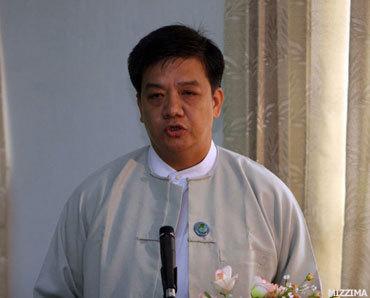A new Burmese press law to cover the print media is unlikely to be submitted to Parliament during the current session.

Tint Swe, the deputy director general of the Ministry of Information’s Press Scrutinization and Registration Department (PSRD), told the Myanmar Times on Monday, “This session is mainly focused on the budget and it probably won’t be possible to submit the draft for approval before it ends.”
However, because of the extra time, he said the ministry could also update the law to address points raised at a January workshop and also a “ministry-level workshop” planned for March, which will be held with support from international organizations including the United Nations Educational, Scientific and Cultural Organisation (UNESCO).
“When we met with international organizations, they asked whether the law has been finalized because it had been sent to the Attorney General’s Office already,” he told the newspaper. “It’s still a draft. We need to take into account the outcomes from the workshops and discuss [the draft] widely. And representatives in the Parliament will also discuss it.
“But while we need to discuss the content and take advice from the workshops it is definite that the law will come out in 2012. After that there won’t be any more censorship,” of print media, he said.
The draft law does not include any changes to electronic media laws, he said.
Earlier, Tint Swe told the media that the draft law was drafted by PSRD officials and included 11 chapters, addressing rights, duties and ethical codes for writers and journalists; principles to be observed by publications; a committee for press freedom and ethical standards; registration of printers, publishers and distributors; and legal penalties.
Though the draft was adapted from the 1962 Law for Registration of Printing and Publishing, Tint Swe said the committee made “many changes,” adopting sections of media laws used by Asian countries as well as Western countries such as the United Kingdom, Germany and Hungary.
“There are many changes [to the 1962 law] in the draft,” he said. “We took the table of contents from the 1962 law but not the content. So while it includes regulations on registration [of publications], it is much more flexible. You don’t need to go through as many steps like in the past. For example, at the moment, you can publish a publication only when the ministry gives a licence. According to the draft, you can easily get a licence and anyone can get one.”
The chief of the VOA’s Burmese Service, Than Lwin Htun, who participated in a media workshop held last week at the Inya Lake Hotel, said the law shouldn’t be used to restrict journalists.
“Some people say that the...censorship board will be abolished but we will have to wait and see. A media law should protect journalists, not restrict them,” he said.
Burmese censorship rules have been modified in recent months and are now divided into two general categories: Group 1 includes nearly 200 publications focusing on sports, health, arts, children’s literature, crime, business and technology, which are not required to pass articles through censors prior to publication, but must submit copies after publication. Group 2 includes around 100 publications focusing on news, economics, and religion, which must pass articles through censors prior to publication.


